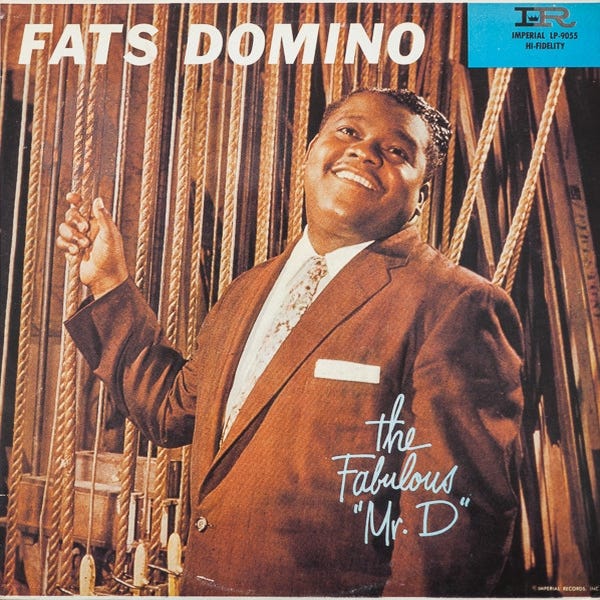Review: Fats Domino - The Fabulous "Mr. D" (1958)
Tracks: 1) The Big Beat; 2) I’ll Be Glad When You’re Dead, You Rascal You; 3) What Will I Tell My Heart; 4) Barrel House; 5) Little Mary; 6) Sick And Tired; 7) I Want You To Know; 8) 44; 9) Mardi Gras In New Orleans; 10) I Can’t Go On; 11) Long Lonesome Journey; 12) Young School Girl.
REVIEW
Fats’ only LP from 1958 was predictably centered around his most recent singles: ‘The Big Beat’ (December ’57), ‘Sick And Tired’ (April ’58), ‘Little Mary’ (July ’58), and ‘Young School Girl’ (August ’58). Imperial Records even gave it a vague semblance of respecting the artist’s chronology, putting up ‘The Big Beat’ as the first track and ‘Young School Girl’ as the last one. In between, however, we have the usual mish-mash: there is at least one B-side which goes all the way back to 1955 (‘I Can’t Go On’), and one more from as far away as 1953 — a cover of Professor Longhair’s ‘Mardi Gras In New Orleans’ (again, you will immediately spot the difference based on the huge discrepancy in sound quality). Finally, there are a few tracks which had not been previously released at all, but they also look more like archival outtakes than original recordings from 1958: the instrumental ‘Barrel House’, at least, is definitely another leftover from the 1953 sessions, and ‘Long Lonesome Journey’ was recorded even earlier, in April 1952.
Let us begin with the singles — all of which charted, but not too high, failing to crack the Top 10 even on the R&B charts, let alone the Pop register (and both of my single-CD Greatest Hits collections ignore them completely). ‘The Big Beat’ is indeed utterly unoriginal, more or less a sped up and boogiefied version of LaVern Baker’s ‘Tweedlee Dee’ whose only outstanding feature is a surprisingly excessive amount of reverb on Fats’ vocals, which somehow produces more of a lulling than a Gene Vincent effect — maybe this is why people did not rush out to buy the record, even if it is still perfectly danceable. ‘Sick And Tired’ is classic angry girl-bashing 12-bar blues redone as a fast-paced merry New Orleanian shuffle — nice, but relatively inefficient, and besides, who really wants to buy a song called ‘Sick And Tired’ from New Orleans’ most famous good-time entertainer? ‘Little Mary’ is definitely more like it ("I want you, I need you, you got me spinning like a top"), but it adds nothing to the legacy of ‘Please Don’t Leave Me’ other than sharper sound quality.
Finally, ‘Young School Girl’, building upon the melodic structure of ‘Blueberry Hill’, comes on like a cold shower on the heads of all unhappy teens: "The school bell is ringing / Vacation time is gone / No more watching the late show / From now on". With the lyrics delivered in the sweetest, most caring fatherly tone, without the least trace of irony, the song is like a perfect family antithesis to Chuck Berry’s ‘School Days’, and unless somebody like Stanley Kubrick would come up with a brilliant idea to use the song in the soundtrack for Lolita, it is hard for me to see how any young person in 1958 could get even the least excited about it. (By the way, did you know that the names of Antoine ‘Fats’ Dominique Domino Jr.’s eight children are Antoine, Anatole, Andre, Antonio, Antoinette, Andrea, Anola, and Adonica? I sure did not).
With all the A-sides being thoroughly «okayish» rather than outstanding, it would be presumptuous to expect anything of higher quality from the B-sides and outtakes. Fats is being quite charming on the old standard ‘What Will I Tell My Heart’ (there is just something magical about the unabashed sentimentalism with which he croons out the title), and that old outtake ‘Long Lonesome Journey’ also has him playing against type on a slow, moody, soulful blues which is closer to the emotional book of Ray Charles than our merry prankster from New Orleans. But that brooding, heartbroken vibe does not come naturally to Fats, not any more than Professor Longhair’s deep wildman vibe, which makes Fats’ cover of ‘Mardi Gras In New Orleans’ essentially useless.
Even the instrumental ‘Barrel House’, from which you could theoretically expect something exceptional, disappoints — beyond the wobbly, repetitive riff introduced from the beginning, Fats does relatively little else on the track, letting his sax player shine for a few bars instead. Not difficult to see why this particular track had been dusting away in the archives for so long: it is more like a warm-up session for the players before getting anywhere serious than something worthy of being focused upon all on its own.
Bottomline: there is precious little that is «fabulous» about The Fabulous ‘Mr. D’, although it is nice to see that Imperial Records still obviously cared about consolidating their artist’s back catalog. On the whole, 1958 was not a very good year for Fats, though this is hardly a big surprise — if you ask me, it is much more of a surprise that the man would manage to eventually return to the respectable sections of the charts than his slide into pleasant mediocrity and self-repetition at a time when even the rock’n’rolling youngsters of America were being subtly drained of their original enthusiasm... and Fats had been doing that for almost a decade by then.
Only Solitaire: Fats Domino reviews


